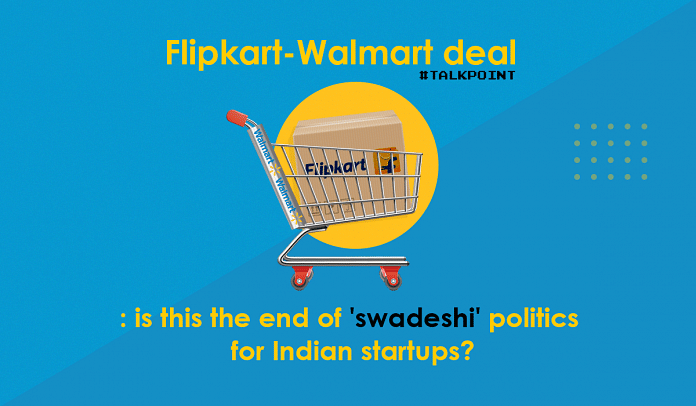Walmart Inc. is likely to close a deal to buy nearly 80% shares in Flipkart, India’s largest e-commerce company. Flipkart will sell for almost US $ 20 billion and provide Walmart access to India’s 1.3 billion people market.
Flipkart and Ola had earlier sought protectionist policies from the government to combat the influence of global giants.
ThePrint asks: Filpkart-Walmart deal: is this the end of ‘swadeshi’ politics for Indian startups?
Companies like Flipkart that have been posing as Indian startups and ‘swadeshi’ are selling out
 Ashwani Mahajan
Ashwani Mahajan
National co-convenor, Swadeshi Jagran Manch
Flipkart has always received funds from abroad; only its promoter was Indian. All the major e-commerce companies in India, supposed to be local startups, aren’t exactly ‘Indian’. Even PayTM is largely funded by Alibaba.
However, now that Flipkart has decided to sell a major chunk of their shares to Walmart, the bigger question we’re facing is this — is this allowed? According to Indian laws, foreign direct investment (FDI) is not allowed in the e-commerce sector. We want to know what the government will do about this.
E-commerce companies like Amazon and others have skirted the issue by saying they only provide a platform to sell. Even then, rules state that they are not allowed to offer price-distorting discounts, but they do it anyway.
The fact of the matter is that this time FDI is in an e-commerce company, Flipkart. Walmart is purchasing a business and they will have to answer technical questions that we hope the government will pose.
Companies that have been posing as Indian startups and ‘swadeshi’ are selling out. We have always been opposed to FDI in retail brands. We have continued our campaign against organised retailing, though our major opposition was to foreign retailers, as they come with deep pockets, sell at predatory prices and kill competition to flush out small retailers. They sell foreign products, and that too Chinese.
We know from the experience of other countries that wherever such domestic companies existed, they all sold out to bigger MNCs. All over the world, giants like Walmart and Cosco have taken over. This move is unfortunate, but not surprising. We urge the government to stop this deal.
For those worried about the Make in India getting punctured, jobs and investment should compensate for the lost pride
 Amir Ullah Khan
Amir Ullah Khan
Visiting Faculty, Indian School of Business
India’s e-commerce market, like many other things, is full of paradoxes. There are more than 400 million internet users, but only a million e-commerce transactions per day. Online sales are about a fraction of the total Indian e-commerce market. More than 7 per cent of the population now has bank accounts, but 75 per cent of e-commerce deals are cash-on-delivery transactions. Regulations are weak and online pharmacies await some clarity before getting into one of the biggest segments in e-commerce.
In such a scenario, the Walmart-Flipkart deal is as exciting as it gets. Not just for the scale of investment. It is not often that we see deals worth $ 12 billion come by and certainly not when global investment is damp. The deal is also important as it gets in a serious competitor into the online retail market in the country. Amazon has been growing exponentially and in three years has upwards of 115 million users. With competition growing, the need to expand markets will see operations increase in small cities and towns that rarely have retail outlets present.
Modern and organised retail has many advantages. It enables access to high-quality goods, cuts down transportation costs, increases shelf lives of perishable products and allows for higher returns to primary producers. In addition to these, it employs a number of semi-skilled workers in procurement packaging and delivery. Only yesterday, Amazon announced 8,000 new jobs in India. With Walmart coming in, the number of jobs will go up significantly.
For those worried about the ‘Make in India’ slogan getting punctured, the jobs and investment flowing in should compensate for the lost pride. In any case, inward-looking protectionist slogans cannot help a growing and globalising economy. It should also be noted that 40 per cent of Flipkart was already shared between a New York’s Tiger Global and Japan’s Softbank. It will now be managed by Walmart, which comes with cutting-edge technology and high service quality. The future of e-commerce looks even brighter, and hopefully, the political class will not interfere with this growth.
There are hardly any Indian startups that are truly Indian or swadeshi
 K Vaitheeswaran
K Vaitheeswaran
Author of “Failing to Succeed”
The Walmart-Flipkart deal, if and when it happens, will seem like the end of swadeshi politics for Indian startups. In reality, though, there are hardly any Indian startups that are truly Indian or swadeshi.
Most Indian startups of note– Flipkart, Snapdeal, PayTM, Ola and others–have raised large investments from overseas funds such as from America, China, Japan, Russia, and South Africa. The original Indian founders, in most cases, are neither majority holders nor in control of the managements of their companies. Their Indianness is limited to their operating primarily in India but they are all really overseas firms and some may no longer even be registered in India but in Singapore.
This is not surprising though. Most of these startups, in their quest for growth have sacrificed profitability and run up huge losses and large overseas funds who have the appetite to fund such losses have picked up big stakes in these firms. The only way Indian startups can remain Indian is to become self-sustainable quickly, which then will allow them to independently manage their destiny without sacrificing control.
The bigger question is – does it really matter? Unlike China, India is an open market and Indian customers decide the market winners. To remain effective and competitive against global giants, Indian startups must access global funds and partnerships, which may result in ceding management control and ‘swadeshiness’. We need an open economy that rewards players because of what they do instead of where they hail from. Let us not promote a startup culture in India where startups are protected against global competition and celebrated just because they are Indian.
If money has a colour, it is ‘videshi’ for Flipkart
 Himani Chandna
Himani Chandna
Special Correspondent, ThePrint
Beware of playing the nationalism card, or do it only when the money in your pocket is all yours, all swadeshi.
Flipkart has nurtured itself through global investors like New York-based Tiger Global, Accel, Japanese multinational SoftBank group and South African internet conglomerate Naspers. If money has a colour, it is videshi for Flipkart.
The nationalism bug is probably a marketing gimmick where brands get into the game but fail to control the narrative in later stages, especially when it is about funds. Flipkart could be a good case study for the startups who thought of selling their brand with the swadeshi tagline.
The idea of being swadeshi ignores a basic principle of economics. It assumes money that a foreign company puts in has no additional effects other than the profit it makes and takes back to its own country.
It does not account for the fact that a videshi company, for instance, Nestle, puts a huge amount of money into the country such as in advertising, which eventually helps domestic advertising agencies thrive. It then generates multiple effects on other sectors, creating jobs and prosperity.
Dear brands, the consumer is not stupid and the strategy to tap the patriotic nerve may not work anymore.
If you still plan to walk the same path, take lessons from Baba Ramdev, the torch-bearer of the so-called swadeshi movement. He hasn’t taken money from foreign investors or at least hasn’t announced any funding yet. A game-changing firm in the Indian FMCG Industry, Patanjali is till now a self-sustained company.
Compiled by Deeksha Bhardwaj, journalist at ThePrint.



